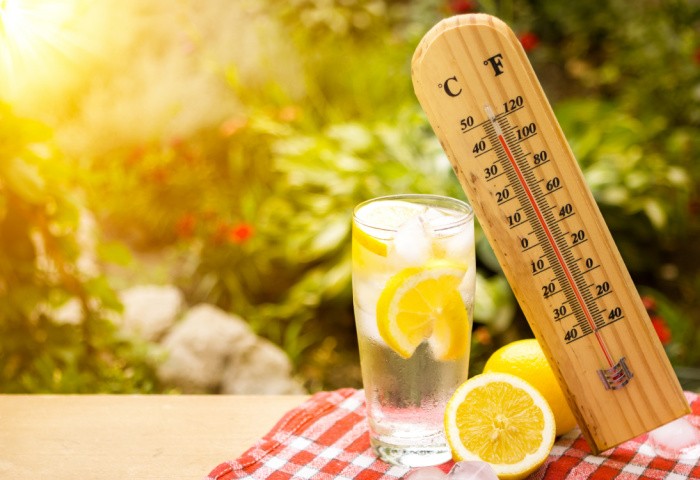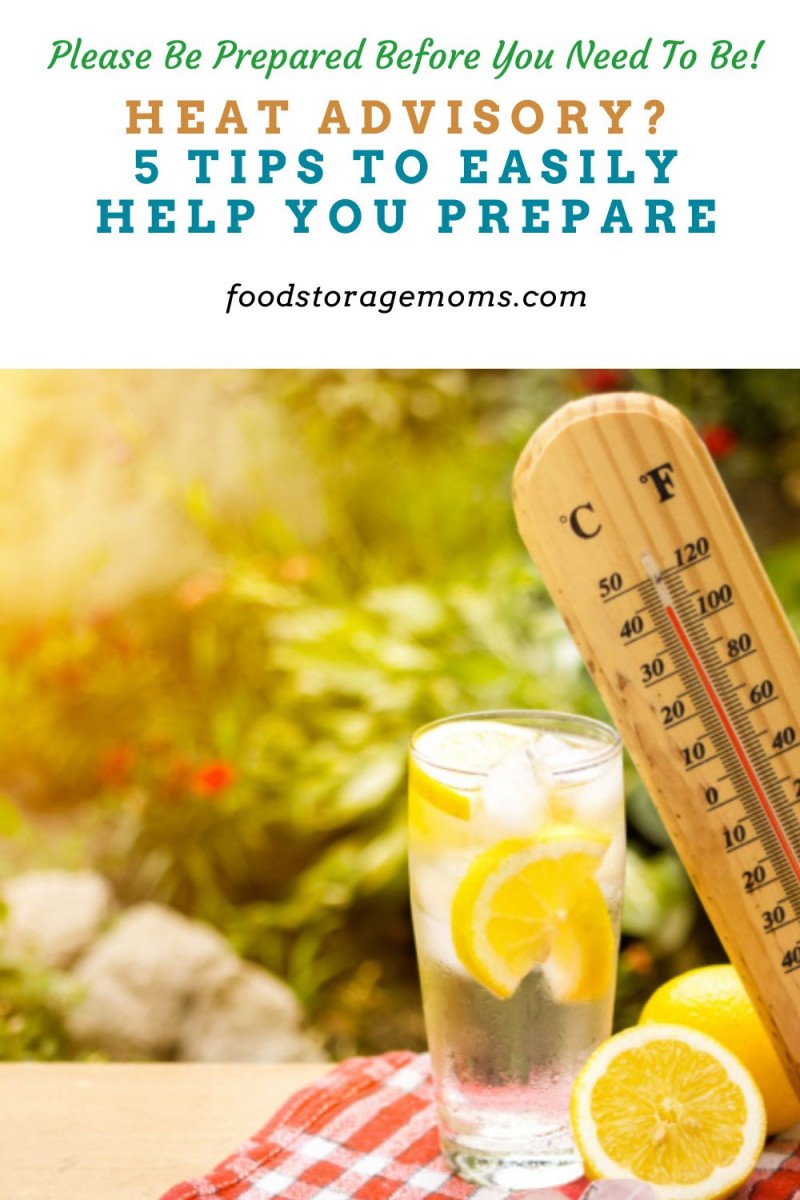Heat Advisory? 5 Tips to Easily Help You Prepare

You often hear about heat advisories and how they can be extremely dangerous, but what are they exactly? A heat advisory is issued when the National Weather Service (NWS) predicts that the temperature is going to be above 90 degrees Fahrenheit (32.2 degrees Celsius) and the heat index is also going to be above 105 degrees Fahrenheit (40.6 degrees Celsius). The heat index is a measurement that takes into account both the temperature and the humidity, which can make it feel even hotter than it actually is. Check out these tips for how to prepare for a heat advisory.
Items I highly Recommend
- Frogg Toggs (you can re-wet them to keep you cool)
- Portable Fan
- Mini Fans (my neighbor wears these every single day)
- Water Bottles (spray your collar if the A/C goes out)

What to Keep in Your Home to Prep for a Heat Advisory
There are a few things you should always keep in your home in case of a heat advisory, or even just a really hot day.
Plenty of Water Stored
The first and most important thing is to have plenty of water stored. It is recommended that you have at least a gallon (3.8 liters) of water per person, per day. If you have pets, you should also make sure to have enough water for them as well. How To Store Water For Drinking And Cooking Hopefully the heat advisory won’t last for very long, so you can plan accordingly for the amount you’ll need based on family size.
I’ve always told my readers that I suggest the number be four gallons per person per day when planning for emergencies. We need water to hydrate, cook our meals, perform some personal hygiene tasks, and at least wash our underwear.
Plenty of Frozen Liquids
Another way to stay hydrated is to have plenty of frozen liquids on hand. This could be anything from ice pops and juice boxes to bags of frozen fruit, or even just a big container of ice cubes. Frozen water bottles can also be helpful as they will help keep your drinks cold and will also eventually turn into drinking water as they thaw. 15+ Items Perfect for Freezer Storage
Be Prepared for Loss of Power
In some cases, a heat advisory in a large can lead to a loss of power as the utility company is overburdened with power demands. This is usually because the demand for electricity is higher than what the power grid can handle. Having a backup plan for this situation is always a good idea. How To Build A Power Outage Kit
Have a Way to Cook Food
If you lose power, you will also lose the ability to cook food. This is why it’s important to have a number of options to cook your food without electricity. This could be anything from a camp stove, Sun Oven, fire pit, or BBQ grill. If you have a gas stove, you should also make sure to have a backup plan in case of a power outage. Tips For Cooking When The Power Goes Out
Have a Way to Keep Cool
If the power does go out, you will need to find a way to keep cool. You can create your very own air conditioning unit by placing a bowl of ice in front of a small battery-operated fan. You can also take a cool shower or bath, or even just wet some towels and place them on your body or in front of that fan. Keeping Cool in the Summer Without Power
Wear the Right Clothing
When it’s hot outside, it’s important to wear the right clothing. This means light-colored and loose-fitting clothing. Cotton is a good fabric to wear since it is breathable and will help you stay cool. Avoid wearing anything too heavy, tight, or dark in color if you have to venture outside.
What to Do During a Heat Advisory
Now that you know what a heat advisory is and how to prepare for one, it’s time to learn what to do during one.
Check on Neighbors, the Elderly, and Pets
During a heat advisory, it is important to check on your neighbors, especially if they are elderly or have young children. It is also important to check on pets, as they can get overheated very easily. If you see anyone who appears to be suffering from heat-related illness, it is important to call 911 immediately. Top 5 Emergency Preparedness Tips for the Elderly
Dress for the Heat
When you are outside during a heat advisory, it is important to dress for the heat. This means wearing loose, lightweight, and light-colored clothing. It is also a good idea to wear a hat or scarf to protect your head and face from the sun. Heat Exhaustion vs. Heat Stroke: What You Need to Know If you have errands to run or chores that just can’t wait, try to accomplish those tasks early in the morning when it tends to be cooler. Avoid mid-day activities since that’s when the temperature is likely to be the hottest.
If you do have to go outside during the advisory, plan to put on some sunscreen to protect your skin. You may have to re-apply the sunscreen more than once, particularly if you are prone to sweat a lot.
Stay in the Shade and Avoid the Sun
If you are going to be outside, it is important to stay in the shade as much as possible. If there is no shade available, you should try to avoid being in the sun altogether.
Avoid Hot and Heavy Meals
Hot and heavy meals can make you feel even hotter, so it is best to avoid them during a heat advisory. Instead, opt for lighter meals that are easy to digest. Fresh salads and fruit are good meal options on hot days.
Drink Plenty of Fluids
It is important to drink plenty of fluids during a heat advisory, even if you are not thirsty. Water is always the best option, but you can also drink fruit juice, sports drinks, and even iced coffee or tea. Avoid alcohol and sugary drinks as they can actually make you feel more dehydrated. How To Know When Someone Is Severely Dehydrated
Take Cool Showers or Baths
Taking a cool shower or bath is a great way to stay cool during a heat advisory. If you don’t have access to a shower, you can also wet some towels and place them on your body or in front of a fan.
Use Air Conditioning
If you have air conditioning, use it! If you don’t have air conditioning, try to spend time in cooled public buildings, such as shopping malls or libraries. Many of us have basements. They tend to stay at a more consistent temperature than our upstairs areas, and in hot weather will be cooler.
Just like in the winter when we need to make sure our windows and doors are closed and sealed properly, the same goes for hot weather and air conditioning. We don’t want to be paying for the cold air that is escaping outside.
Monitor Your Body for Signs of Heat-Related Illness
It is important to monitor your body for signs of heat-related illness, such as dizziness, nausea, headache, or muscle cramps. If you start to feel any of these symptoms, it is important to get out of the heat and into a cool environment immediately.
Call 911 if You or Someone Else Experiences Heat-Related Illness
If you, or someone else in your household, experiences heat-related illness, it is important to call 911 immediately. Let the experts determine if it is at a life-threatening level.
Final Word
If a heat advisory is issued in your area, it is important to take it seriously. By following the tips above, you can stay safe and cool during a heat advisory. It’s vital to start preparing for a potential heat advisory now rather than waiting until it is announced and then responding. Failing to plan ahead is a scary way to live. May God Bless this world, Linda
Copyright Images: Heat Wave AdobeStock_88676421 by Cherries